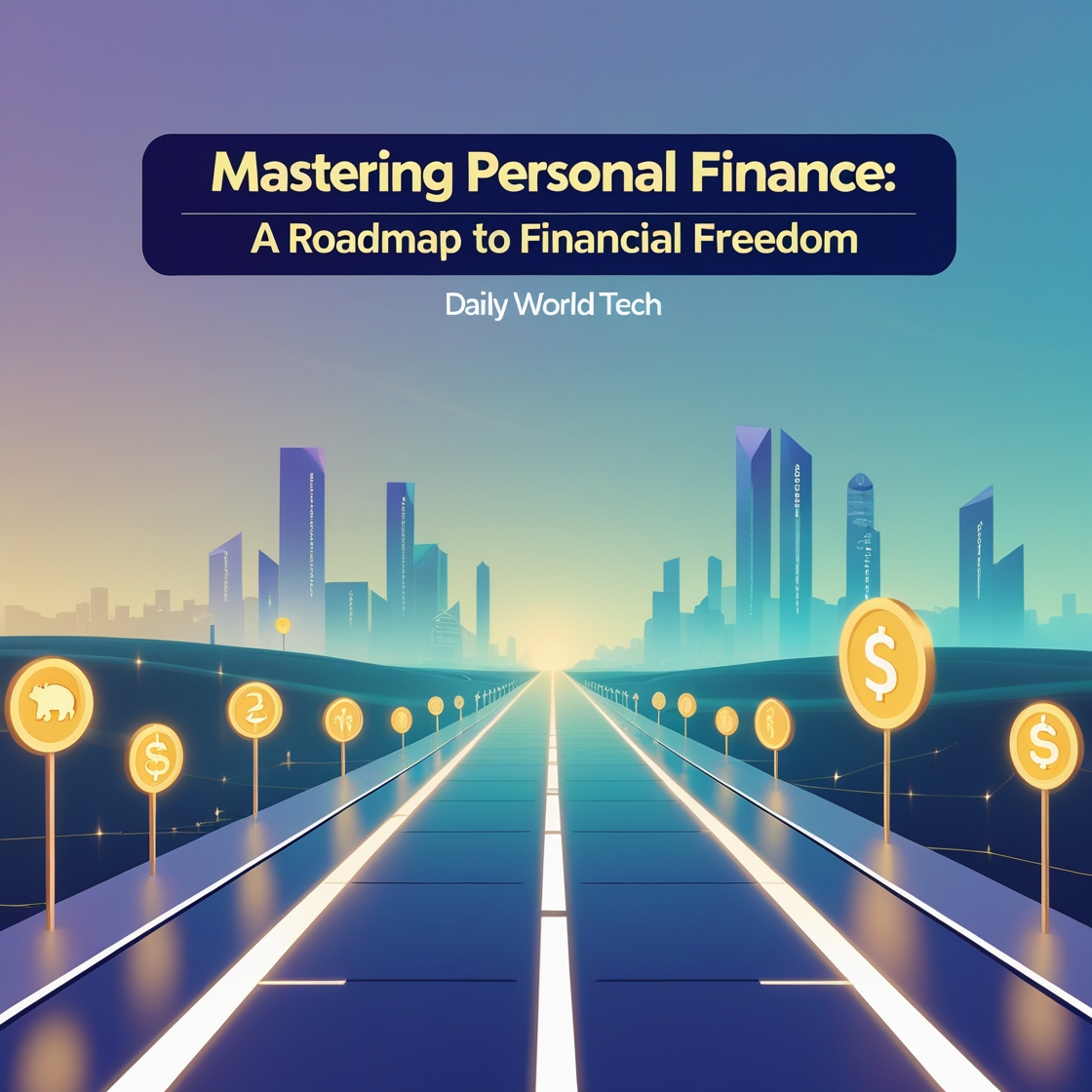Money management does not have to be very complex. Personal finance might sound like a really complicated subject at first it is full of budgets, Excel sheets, financial terms, and retirement plans. However, in fact, it can be really easy when it is narrowed down to smaller bits that are simple to handle. With a little bit of attention to major principles and implementation of the same on a regular basis, anyone can help himself/herself clear the confusion in the monetary life and move towards control.
The personal finance practicable and simple steps that can be taken by anyone are mentioned in this blog. These are some of the methods that can result in big and long-term changes whether you want to get out of debt, build wealth, or simply gain a better overall notion of your spending.

1. Learn to Know Where Your Money is Spent
To be a master of your finances, you need to have a picture of what your position is at a given moment. You should first be aware of how you are spending your money before you are able to set a goal or even prepare a budget.
Begin by keeping an account of all the expenses during a month. Include bills, groceries, fuel, entertainment, subscriptions, and even smaller purchases like coffee or a snack. Make use of tools such as:
- Spreadsheet
- Mobile apps like Mint, YNAB, or PocketGuard
- A concrete notebook
As soon as you reveal the patterns, you will be shocked that you spend money on things which do not add value to your life. The greatest step towards improvement is awareness.
2. Make an Easy Budget Which Works
Having a budget does not imply restriction but rather allocating each dollar with a goal. A budget is the blueprint that will indicate to your money where to go rather than pondering where a dime went.
Use the 50/30/20 rule as a starting point:
- 50% on needs (housing, food, utilities, transport)
- 30% on wants (entertainment, dining, hobbies)
- 20% on savings and debt repayment
Adjust these percentages according to your lifestyle and financial ambitions. It is not about being perfect; it is about having purpose.

3. Cultivate an Emergency Fund First
Life is unpredictable—medical expenses, car problems, or even job loss can strike at any time. An emergency fund serves as a safety net to protect you from going into debt during a crisis.
As a starter, save at least $500–$1,000, then gradually increase this to cover 3 to 6 months of basic living expenses.
Keep this money in:
- A high-yield savings account
- A separate account accessible but not so convenient that you’re tempted to use it
Never use this fund for non-emergencies like sales or vacations.
4. Get Rid of High-Interest Debt
One of the major obstacles to financial liberty is debt especially credit card debt that can carry astronomical interest rates. Paying off debt should be a priority.
Two popular approaches are:
- Debt Snowball – Pay off smaller debts first for quick wins and motivation
- Debt Avalanche – Pay off the highest interest debts first to save the most money
Choose the method that suits your personality and stay consistent. As debts shrink, both your confidence and financial health will grow.
5. Automate Your Finance
Automation allows you to manage money effortlessly and stay on track.
You can automate:
- Bill payments – Avoid late fees and build good credit
- Savings – Automatically deposit funds into a savings account each payday
- Investments – Automatically contribute to retirement or brokerage accounts
Making personal finance automatic removes excuses and human error.

6. Pay Yourself First (Save Before You Spend)
Most people spend first and try to save what’s left often, nothing. Flip the formula: save first, then spend the rest guilt-free.
Here’s how:
- When your paycheck arrives, immediately set aside a portion for savings or investments
- Even small savings like $20–$50 per paycheck add up over time
- Set specific goals: emergency fund, vacation, home purchase, etc.
Treat savings like a fixed bill it builds a non-negotiable habit.
7. Get Investing at an Early Age (Don’t Wait to Buy A Lot)
You don’t need to be wealthy to begin investing just time and consistency. With the power of compound interest, the earlier you start, the better.
Start with:
- Employer-sponsored retirement plans (e.g., 401(k) with match)
- IRAs or Roth IRAs
- Low-cost index funds or ETFs
Even investing $100/month can grow into thousands over decades. Don’t try to time the market—focus on time in the market.
8. Learn to Understand the Difference Between Needs and Wants
Controlling impulsive spending is one of the most powerful personal finance skills. It doesn’t mean you can’t enjoy life—it means spending intentionally.
Ask yourself:
- Do I need this or just want it?
- Can it wait 24–48 hours?
- Does it align with my goals?
Avoid lifestyle inflation spending more as you earn more to build long-term wealth and peace of mind.
9. Develop Financial Goals and Check Them Periodically
Without goals, your money lacks direction. Financial goals give purpose and focus to your actions.
Example goals:
- Short-term: Save $1,000 for an emergency fund
- Mid-term: Pay off $10,000 in debt
- Long-term: Build $500,000+ in retirement savings
Write them down, break them into steps, and review monthly or quarterly to stay accountable.
10. Raise Your Income Purposely
Saving is vital, but cutting back has limits. Earning more increases your financial freedom.
Ways to boost income:
- Ask for a raise
- Take on freelance or part-time work
- Sell unused items online
- Create digital products (eBooks, courses)
- Learn high-income skills (coding, design, marketing)
Use extra income wisely don’t fall into the trap of spending more just because you earn more.
11. Learn Lifelong
Financial literacy is an ongoing skill. The more you know, the better your decisions will be.
Ways to educate yourself:
- Read books like Rich Dad Poor Dad, The Psychology of Money, or Your Money or Your Life
- Listen to personal finance podcasts
- Watch YouTube channels or take free online courses
It’s never too late to start learning.
12. Secure Your Financial Future
As you build wealth, protect it.
That includes:
- Insurance – health, auto, life, renters/homeowners
- Estate planning – wills and asset distribution
- Fraud protection – strong passwords, two-factor authentication, and credit monitoring
Financial protection is like a seatbelt you might not need it until you do.
13. For Day-to-Day Expenses, Use Cash or Debit
Credit cards are useful but can lead to overspending. For daily use, consider:
- Cash envelopes – for groceries, entertainment, etc.
- Separate checking accounts or prepaid debit cards – for discretionary spending
This creates a spending limit and encourages mindful buying.
14. Celebrate Financial Victories (Large or Small)
Finance doesn’t have to be boring. Celebrate milestones to stay motivated.
Examples:
- Paid off a credit card? Treat yourself modestly.
- Reached a savings goal? Acknowledge it and share it.
- Stayed on budget for 3 months? That’s worth celebrating!
Rewarding yourself builds positive reinforcement.
15. Never Compare Your Money to Other People
Social media can make you feel behind, but:
- Everyone’s financial journey is different
- Appearances may hide debt-backed lifestyles
- Your only competition is yesterday’s self
Stay focused on your own progress.
16. Practice Gratitude and Mindful Spending
Gratitude helps shift your focus from what you lack to what you already have. Mindful spending means aligning your spending with your values.
Before a purchase, ask:
- Will this bring long-term satisfaction?
- Does it support my goals?
- Am I buying this for me or for others?
Living within your means becomes easier with gratitude.
17. Take Advantage of Technology
Apps can simplify your finances. Use them to:
- Track expenses (Mint, YNAB)
- Check your credit score (Credit Karma)
- Automate savings (Qapital, Chime)
- Invest easily (Robinhood, Acorns)
Let technology do the work and support your habits.
18. Communicate About Finances
Money is a taboo topic in many cultures, but silence creates ignorance.
Be honest with:
- Your partner – align goals and spending
- Your children – teach financial habits early
- Trusted friends – share knowledge and strategies
Talking about money normalizes it and reduces guilt.

19. Avoid Lifestyle Creep
As income rises, so does the temptation to upgrade. This is called lifestyle inflation.
Avoid it by:
- Keeping fixed costs low
- Saving raises or bonuses
- Living below your means
Simplicity today builds wealth tomorrow.
20. Go Step by Step
Remember, personal finance is a journey not a race. Don’t try to do everything at once.
Focus on one area budgeting, saving, or investing and master it before moving on.
Consistency > Perfection
Small actions over time lead to massive results.














